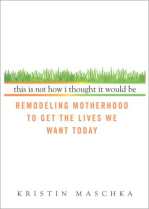As my daughter approaches middle school, my anxiety about college increases and I feel a looming pressure on us (okay probably me) to spend time making sure our daughter is in the right school, has access to the right extracurricular activities to be able to get into college – given that getting into college is far more competitive than when my husband and I entered.
I think it was that anxiety that recently led me to read the full report titled “The Rug Rat Race” from the Brookings Institute that was also highlighted in the New York Times column the Motherlode, The College Race Brings Families Together? The report examines data on parental time with children (data I’m very familiar with from writing my book This is Not How I Thought It Would Be: Remodeling Motherhood to Get the Lives We Want Today) and data on the competitiveness of getting into college. The researchers, Gary Ramey and Valerie Ramey, conclude that particularly for college-educated parents, the reason parents started spending lots more time with their children – especially older children – is a “rug rat race” in which parents invest more and more time preparing children for increasingly rare slots in college.
The data in the report definitely shows a correlation between increased parental time and increased competitiveness for colleges, but that doesn’t necessarily mean causation. I think the two are related, but I think that there are two missing factors in their analysis.
First, I believe that bubbling underneath the anxiety about college entrance – and frankly underneath a host of the parental anxiety we wallow in these days – there is a general economic insecurity families have – both for themselves and for their children. I think families are intuitively aware of the increasing gap between the haves and the have-nots. They feel their own struggles to hang on to a middle class lifestyle as costs go up and wages stay flat. One of the ways that economic insecurity plays out is in time invested in children in the hopes (rationally or not) that that investment will pay off in terms of the child’s success and security in the future.
Second, I think the report leaves out the generational differences that kicked in over the same time period. Millennials (or Gen Y) started being born in 1982, which makes them about 12 by the mid 1990’s – the point at which the report documents an increase in parental time, especially with older children. Generational research tells us that Millennial kids have a closer relationship with their Gen X parents than those Gen X’ers did with their Boomer parents. Gen X parents are also different as parents than their Boomer counterparts – including ramping up the cultural norms around intensive parenting. So the increase in time spent with older children is probably in part due to a generational shift in which parents and kids alike actually LIKE to spend time together more than previous generations and the cultural norms expect it.
I hope that perhaps my awareness of these factors will help me ramp down my own anxiety. However, I also hope that the people around me – my own parents, educators, our community – will come to understand that in many ways my anxiety is justified and that this generation of parents – and their rug rats – are different themselves and are live in a different world than they did.





Hi Kristin,
I think you’ve got your generations mixed up. The Baby Boomers are the parents of the Millennials, not Gen Xers. The parents of Gen X are the so-called “silent generation” who came between the “greatest generation” and the Boomers. And Gen Xers’ kids are so young that they don’t even have an “official” name for their generation.
Do I think that Gen X moms like myself parent differently than Boomer and “silent gen” moms? Yes. I personally believe that it’s a reaction to how so many of us grew up in broken homes and/or as latchkey kids. Even if our own families were traditional, we saw the negative effects on our friends. And we vowed to do a better job making family our priority.
Until recently you’d be right, I didn’t mix it up – but I should have clarified something – thanks for pointing it out. The first batch of Millennials had Boomer parents. But we’re in the midst of the movement of the generations through the K12 system, and the shift from Boomer parents of Millennials to GenX parents of Millennials. Check out slide 36 of this presentation on generations (The presentation takes awhile to download.) By 2013, GenX parents will be 82% of the parents of college freshman. Pretty soon our K-12 system – esp middle and high schools – will be full of GenX parents of Millennial kids. I’m one of that cohort. And yes, soon the elementary schools will start filling with the “unnamed generation” – the children of Millennials.
I’d agree with you that part of the reason GenX parents parent differently is there experiences growing up. In fact the report above points out how “latchkey kids” have become “stealth-fighter parents.” Even more fearsome than “helicopter parents!” I guess I don’t see our way as “better” or “worse” as parents, and instead see it as a natural outcome of our generational experience.
The presentation above comes from one of the co-founders of LifeCourse Associates.
Have you taken the quiz “How Millennial Are You?” from Pew? Very fun. I’m a 71, so I’m a good GenX/Millennial translator I guess!